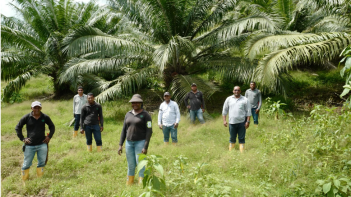| Click icon to download PDF |
Click link for translations
| Bahasa Indonesia |
JAKARTA, 6 MEI 2013 – The resolution on the revised Principles & Criteria (2013) of the RSPO (Roundtable on Sustainable Palm Oil), an international certification scheme and multi-stakeholder association for sustainable palm oil was ratified by its members at the recently held Extraordinary General Assembly (EGA) in Kuala Lumpur, Malaysia. A total of 222 RSPO members (almost three times the required quorum) from the seven sectors voted at the EGA, including proxies. There were equal numbers of growers and consumer goods manufacturers as the two largest sectors represented at the EGA, followed closely by Processors & Traders and the other sectors from Retailers, Non-Governmental Organizations (NGOs) and Banks.
Darrel Webber, Secretary General of the RSPO commented that: “We are very pleased that the revised Principles & Criteria (2013) that was implemented on the ground for the last 5 years has been presented and accepted at the General Assembly of RSPO members. The enhancements in the revised RSPO standard encapsulate additional criterion on GHG emissions; pesticides; peat planting; forced labour; human rights and corruption.”
“As an international scheme for a global commodity – the RSPO views its evolutionary approach in enhancing its standard every 5 years as critical to sustain its relevance in staying ahead of best sustainable practices. This continuous improvement will allow for significant impact on the global market place in enabling sustainable practices to become mainstream over time in addressing wide spread issues such as deforestation; social issues, land conflicts; wild life destruction, amongst others.” Webber commented.
Following the adoption of the revised P&C, the process of implementation will soon commence in the major producer markets Indonesia and Malaysia; through a process called the National Interpretation (NI) which aims at ensuring that the revised P&C is coherent with existing national regulations. This is a valuable platform for Indonesian stakeholders to actively participate by contributing towards the development of the NI for the country.
In addition to deploying the revised P&C on the ground, two other strategic priorities for the RSPO include efforts towards accelerating uptake of Certified Sustainable Palm Oil (CSPO); and enabling certification of smallholders in producing nations.
On the aspect of uptake, the RSPO is working closely with various National Endeavours in Europe https://rspo.org/en/national_endeavours who have made tangible commitments towards CSPO – these markets include the Netherlands, Belgium and the UK as well as a few other key nations establishing similar initiatives. The RSPO is also focusing its efforts in India and China who are two largest importers of palm oil – to ensure they participate actively towards embracing the agenda of sustainable palm oil over the mid to long term.
In the area of smallholders, the RSPO has recently introduced the RSPO Smallholders Support Fund (RSSF) for eligible oil palm growers amongst smallholders around the world. These will include largest oil palm producing countries Indonesia and Malaysia, as well as Thailand, Papua New Guinea, Latin America and Africa, amongst other producing nations. “We encourage smallholders from Indonesia to explore the possibility of fully leveraging this initiative. We are aware of the dominant role smallholders around the world play in the palm oil sector to promote and increase the production of Certified Sustainable Palm Oil (CSPO) so that market transformation is realized.” Webber concluded.
On the review process of the P&C:
The review process of the P&C is also in compliance with the global association for sustainability standards, the ISEAL Alliance’s Codes of Good Practice, which recommends that a standard must be reviewed at least every five years: http://www.isealalliance.org/. The RSPO Executive Board entrusted the P&C Review Task Force to review and amend the P&C to maintain the standard’s relevance and effectiveness. The P&C review process began in November 2011. Comments were generated from two public consultations and discussions in four Task Force meetings.
The final revised P&C (2013) document can be accessed here:
The FAQ can be accessed here
On the RSPO Smallholders Support Fund (RSSF):
Interested applicants may submit their applications by filling up the form, which can be downloaded at: https://rspo.org/en/rspo_smallholders_support_fund
— End —
Note to Editors:
15% of world's palm oil production is now RSPO certified
Implemented in 2008, the RSPO standard has been globally accepted in major palm oil producing countries around the world, including Indonesia, Malaysia, Thailand, Papua New Guinea, Solomon Islands, Latin America, West Africa and Cambodia. To date, approximately 15% of crude palm oil produced globally is RSPO certified covering an area of 2.2 million hectares of certified area. The RSPO also has its own Trademark for end consumer products. Within close to 2 years 105 licensees have been granted across over 20 countries, now offering a well-informed and ethical choice for consumers.
For more market related information: https://rspo.org/en/Market_Data_-_as_at_31st_March
Connect with us: LinkedIn; Twitter; Facebook; Newsletter
About RSPO
In response to the urgent and pressing global call for sustainably-produced palm oil, the Roundtable on Sustainable Palm Oil (RSPO) was formed in 2004 with the objective of promoting the growth and use of sustainable oil palm products through credible global standards and engagement of stakeholders. The seat of the association is in Zurich, Switzerland, while the secretariat is currently based in Kuala Lumpur with a satellite office in Jakarta.
RSPO is a not-for-profit association that unites stakeholders from seven sectors of the palm oil industry – oil palm producers, palm oil processors or traders, consumer goods manufacturers, retailers, banks and investors, environmental or nature conservation NGOs and social or developmental NGOs – to develop and implement global standards for sustainable palm oil.
Such multi-stakeholder representation is mirrored in the governance structure of RSPO such that seats in the Executive Board and project-level Working Groups are fairly allocated to each sector. In this way, RSPO lives out the philosophy of the "roundtable" by giving equal rights to each stakeholder group to bring group-specific agendas to the roundtable, facilitating traditionally adversarial stakeholders and business competitors to work together towards a common objective and make decisions by consensus.
For more information, please contact:
| Contact for Indonesia: Desi Kusumadewi RSPO Indonesia Director T: +62 21 5794 0222 [email protected] |
Contact for RSPO Secretariat: Anne Gabriel Communications Director T: +603-22012053 [email protected] |
Keep reading

Access into prisma

Updated Trace Function in prisma

Call for Expression of Interest: Independent Investigation of a Complaint

Latin American Smallholders, Key Global Brands Gather in Peruvian Amazon to Advance Sustainable Palm Oil

RSPO Forum for Members and Certification Bodies 2025: Strengthening Capacities and Building Bridges with RSPO Members

From Violence to Prosperity: Cultivating Sustainable Palm Oil in San Pablo, Colombia

Palmas de Tumaco: Enduring, Trusting, and Transforming in Colombia’s Pacific Coast
Carry Over Credits for Certified Independent Smallholder Groups




